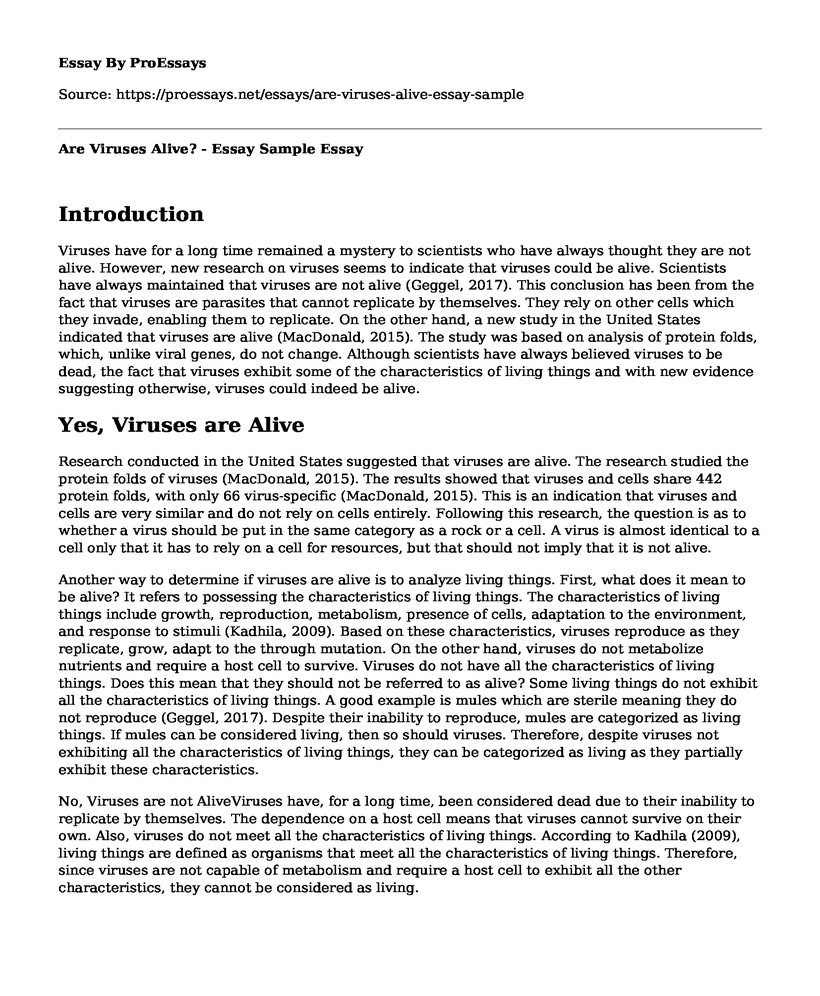Introduction
Viruses have for a long time remained a mystery to scientists who have always thought they are not alive. However, new research on viruses seems to indicate that viruses could be alive. Scientists have always maintained that viruses are not alive (Geggel, 2017). This conclusion has been from the fact that viruses are parasites that cannot replicate by themselves. They rely on other cells which they invade, enabling them to replicate. On the other hand, a new study in the United States indicated that viruses are alive (MacDonald, 2015). The study was based on analysis of protein folds, which, unlike viral genes, do not change. Although scientists have always believed viruses to be dead, the fact that viruses exhibit some of the characteristics of living things and with new evidence suggesting otherwise, viruses could indeed be alive.
Yes, Viruses are Alive
Research conducted in the United States suggested that viruses are alive. The research studied the protein folds of viruses (MacDonald, 2015). The results showed that viruses and cells share 442 protein folds, with only 66 virus-specific (MacDonald, 2015). This is an indication that viruses and cells are very similar and do not rely on cells entirely. Following this research, the question is as to whether a virus should be put in the same category as a rock or a cell. A virus is almost identical to a cell only that it has to rely on a cell for resources, but that should not imply that it is not alive.
Another way to determine if viruses are alive is to analyze living things. First, what does it mean to be alive? It refers to possessing the characteristics of living things. The characteristics of living things include growth, reproduction, metabolism, presence of cells, adaptation to the environment, and response to stimuli (Kadhila, 2009). Based on these characteristics, viruses reproduce as they replicate, grow, adapt to the through mutation. On the other hand, viruses do not metabolize nutrients and require a host cell to survive. Viruses do not have all the characteristics of living things. Does this mean that they should not be referred to as alive? Some living things do not exhibit all the characteristics of living things. A good example is mules which are sterile meaning they do not reproduce (Geggel, 2017). Despite their inability to reproduce, mules are categorized as living things. If mules can be considered living, then so should viruses. Therefore, despite viruses not exhibiting all the characteristics of living things, they can be categorized as living as they partially exhibit these characteristics.
No, Viruses are not AliveViruses have, for a long time, been considered dead due to their inability to replicate by themselves. The dependence on a host cell means that viruses cannot survive on their own. Also, viruses do not meet all the characteristics of living things. According to Kadhila (2009), living things are defined as organisms that meet all the characteristics of living things. Therefore, since viruses are not capable of metabolism and require a host cell to exhibit all the other characteristics, they cannot be considered as living.
Conclusion
New research has disputed the notion that viruses are not living. The study showed that cells and viruses share up to 442 protein folds (MacDonald, 2015). Additionally, viruses exhibit most of the characteristics of living things; thus, they should be considered living. Science is an ever-evolving field that needs to accept new research. Previously, the world was thought as flat but was later found to be spherical. Similarly, the definition of living things needs to change to accommodate viruses.
References
Geggel, L. (2017, Feb 25). Are Viruses Alive? LiveScience. Retrieved from https://www.livescience.com/58018-are-viruses-alive.html
Kadhila, N. (2009). NSSC Biology Module 1 Student's Book. Cambridge, MA: Cambridge University Press.
MacDonald, F. (2015, Sep 28). Viruses are Alive, and they're Older than Modern Cells, New Study Suggests. Science Alert. Retrieved from: https://www.sciencealert.com/viruses-are-alive-and-they-re-older-than-modern-cells-new-study-suggests
Cite this page
Are Viruses Alive? - Essay Sample. (2023, Feb 06). Retrieved from https://proessays.net/essays/are-viruses-alive-essay-sample
If you are the original author of this essay and no longer wish to have it published on the ProEssays website, please click below to request its removal:
- Essay Sample on Angiotensin-Converting-Enzyme Inhibitor
- Essay Sample on Patient Education
- Essay Sample on Euthanasia: Right to Die with Dignity
- Essay Example on Jean Watson's Caring Theory: Enhancing Healing and Satisfaction
- Essay Example on Nurses: Navigating Multiplex Issues With Ethical Codes
- Essay Example on Abortion Debate: Pro-Choice and Pro-Life Views in 2021
- Free Essay Example on Addressing Nursing Shortage: Educational Background, Expertise







